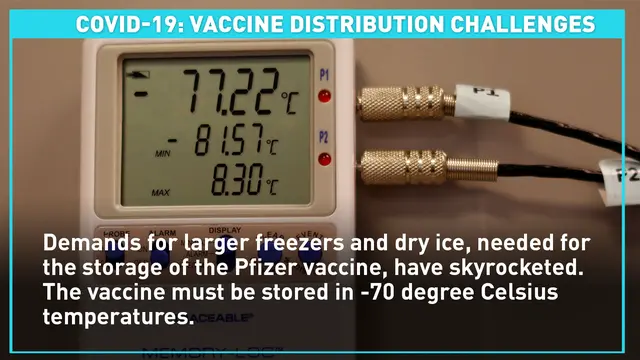On Tuesday, the U.K. rolled out its COVID-19 vaccine campaign, with the National Health Service delivering the first jabs or injections of the approved Pfizer/BioNTech shot.
But major logistical challenges remain for the health service to make sure that the vaccine is given to tens of millions of people.
In order to compensate for the large number of people that need the shot, the government has set up temporary clinics. Retired health workers and tens of thousands of recruited first aid workers are also being asked to help administer the vaccine.
Shipping and storing the vaccine could also face a major challenge, as the demand for large-scale freezers and dry ice skyrocket.
The vaccine from Pfizer will need to be stored at minus 70 degrees Celsius before its injected.
The possible emergency approval of the vaccine could leave many places in the U.S. without the necessary tools to manage the inoculation, especially in rural parts of the country.
While some states are looking at other alternative vaccines being developed, hospitals are still planning on taking the Pfizer shot, expressing concern over the logistics involved.
Some dry ice suppliers are also concerned about how much ice will actually be needed by different states.
Reuters notes that many ethanol plants, a key source of carbon dioxide, which is used for dry ice, were shuttered early during the pandemic, and despite improvements, production still remains low.
A number of U.S. states are expecting delivery of vaccines within the next week, with plans to apply the vaccines first to health workers and long-term care residents.
Along with logistics and storage, there is also a growing concern of the security of the vaccine, especially cyber-security.
The European Medicines Agency says it was hit by a cyber-attack related to the vaccine, with the regulatory submission from German firm BioNTech, accessed during the attack.
According to reports, it’s not clear when and how the attack took place, who is responsible and what other information was taken, though the Pfizer and BioNTech said no personal data of trial participants was comprised in the breach.
Early in this month, IBM’s cybersecurity teams warned that a slew of cyberattacks were underway against governments and companies that would be distributing the vaccine.
(CGTN)
 简体中文
简体中文

